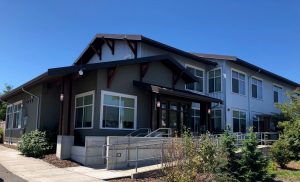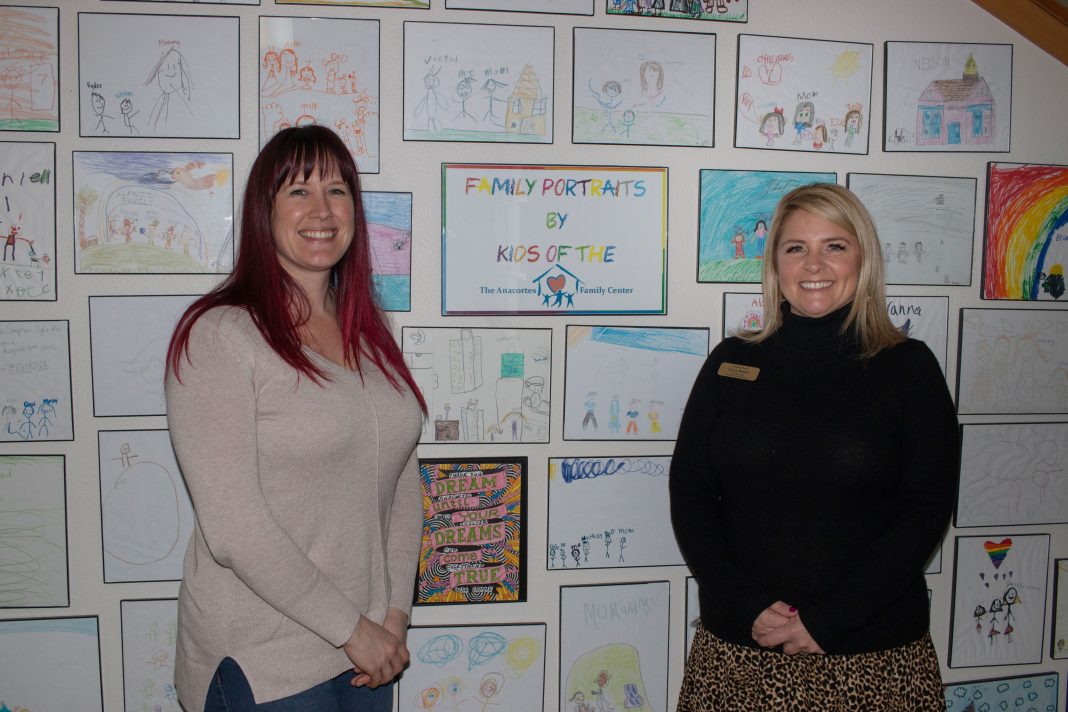When Gina Walsh moved to Anacortes several years ago with her family, she had her daughters join a peewee cheer program so they could make friends with girls from other schools.

One day, Walsh – a Peoples Bank district manager based at the Anacortes Office – was giving one of her daughter’s new friends a ride home. When the girl said she lived at the Anacortes Family Center (AFC), Walsh realized she had no idea what it was.
Soon after, Walsh met Dustin Johnson, AFC’s executive director, and took a tour of the facilities. That day, Walsh not only learned about the AFC’s mission to help families in poverty but also decided to join its board and become part of the organization.
“Anacortes Family Center is so much more than a homeless shelter,” she says. “The work being done there really spoke to my heart, and from that moment, I wanted to be involved in any way that I could.”
Changing Lives
The Anacortes Family Center offers a series of programs and resources to help struggling families re-establish themselves and become self-sufficient following a period of crisis. They help both single parents and couples with children get back on their feet.
The AFC works to identify the family’s barriers to success, figure out their short and long-term goals, and put them on a path to overcome those barriers and meet those goals. Programs include motel vouchers, helping get people off the street short-term during the cold of winter, as well as an emergency 60-90-day shelter and Family Transformation Center for families needing more time (up to two years) and support in order to achieve self-sufficiency.

In each of the emergency shelter’s nine apartments, families live in fully furnished households while receiving any supplies they lack. The family then forms a longer-term plan through daily case management. The AFC, says Johnson, has the highest success rate for a 90-day homelessness program in the state. Last year, 85 percent of families who used the emergency shelter graduated successfully from the program.
AFC also recently opened a 20-apartment affordable housing building for those no longer requiring AFC services, but who still need an affordable place to stay. For those dealing with domestic violence or mental health issues, longer-term care and support resources are available. The center has seven dedicated therapists of various specialties, and children have weekly appointments to identify any academic or social challenges they may be facing.
The AFC also has a transitional living program with nine fully furnished apartments, allowing residents to stay for up to 24 months. With this program, Johnson says AFC collects 30 percent of each family’s income as “rent,” but holds the money in escrow.
When families graduate the program, the money is given back as a scholarship or can be used as a down payment for a mortgage. Several families have even gone on to qualify for conventional mortgages, using scholarships for the down payment. The money can also be used as emergency funding, put into a savings account, college fund for children, or as a certificate of deposit (CD).
Peoples Helping People
In addition to AFC’s many local partnerships to tackle employment and housing concerns, support from Peoples Bank has helped clients address budgeting issues.
AFC clients are offered once-a-week life skill classes for adults, school-age children, and even toddlers, Johnson says. Leaning on her role as a banker, Walsh teaches adult financial literacy courses each quarter.

“While Gina is talking to the adults about credit and saving for college, their school-aged children might be decorating a piggy bank and learning about the importance of saving,” Johnson says. “And the little kids might be doing a mock grocery store trip and identifying currency. So, we wrap around the entire family.”
Walsh says she focuses on banking, credit, landlord-tenant information, and credit reports, among other topics. She explains the “check systems,” which can prevent a client from getting a bank account if it flags something in their past financial dealings. When an AFC client comes to meet her at the bank, she works with them one-on-one to resolve any issues, even if it takes time. If a client can’t get a checking account right away, they’ll set up a savings account until then.
“She’s great at breaking down walls and barriers and getting people to feel safe and comfortable discussing their history with her,” Johnson says of Walsh. “It encourages them to start making those positive steps financially.”
In addition to Walsh’s personal involvement, Peoples Bank sponsors a twice-annual “Shred-A-Thon,” where community members can make donations to AFC in exchange for having them shred any unneeded household documents.
Coming up on February 6, AFC and Peoples Banks will be collaborating with local retailers and restaurants in Anacortes to put on “Dine and Shop to End Homelessness.” Participating businesses will donate 10 percent or more of their entire day’s proceeds to the AFC, and raffle tickets for numerous local prizes will also be available.
In reflecting on what AFC does, Walsh says she is humbled to be part of the effort to help lift local families out of poverty and build the lives they want.
“It’s a huge honor for me to have a small part in what people are doing to help themselves,” she says. “I never even imagined I could be part of something that so seriously changes people’s lives every day.”
Sponsored





































